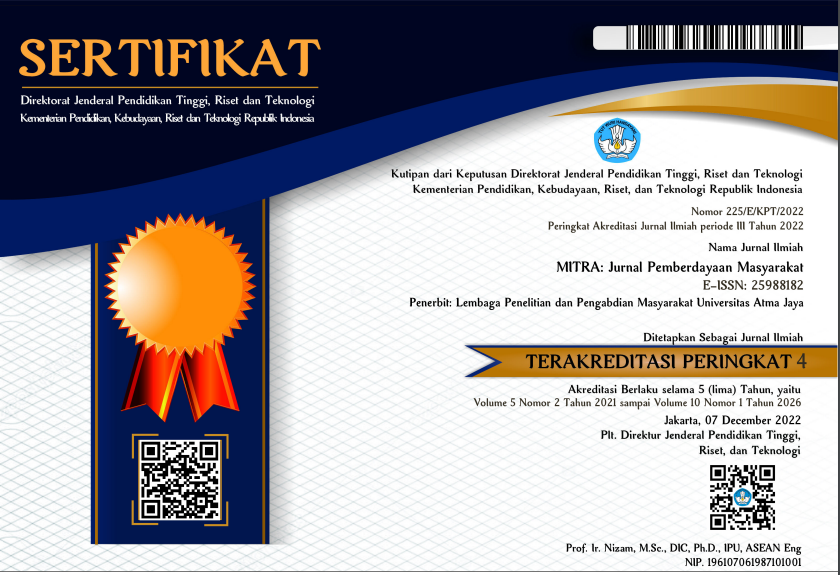A Training on Tempeh Processing for Dharma Wanita Persatuan Members of LPKA Kelas II Jakarta
DOI:
https://doi.org/10.25170/mitra.v6i2.2919Keywords:
Dharma Wanita Persatuan, online training, soybean tempeh makingAbstract
The practice of social distance and the work-from-home policy due to the Covid-19 pandemic has made activities to improve the skills of Dharma Wanita Persatuan (DWP) members in Lembaga Pembinaan Khusus Kelas II Jakarta which are routinely carried out limited. Online training on making soybean tempeh is one solution to continue carrying out skill-building activities. Soybean tempeh is an Indonesian fermented food made from soybeans. Tempe is one cheap and readily available protein source in Indonesia. In addition, the consumption of tempeh can provide health benefits, such as increasing the immune system. This community service aims to provide online education about tempeh, the benefits of consuming tempeh, and training on its production to women who are members of DWP LPKA Kelas II Jakarta. The community service was carried out by sending them a kit containing ingredients to make soybean tempeh, providing instructions for tempeh processing and discussion facilities in a WhatsApp Group, providing online training synchronously with Zoom, and monitoring and evaluating the tempeh produced. From the implementation of the community service, participants have successfully made tempeh that is healthy, hygienic, and of good taste. To conclude, this community service has been successfully implemented and provides benefits for the participants.
References
Akbar, H., & Hadiansyah, M. I. (2021). Edukasi tips memilih, mengolah, dan menyajikan makanan yang aman pada mahasiswa STIKES Graha Medika secara daring menggunakan aplikasi Zoom Cloud Meetings. Jurnal Pengabdian UntukMu NegeRI, 5(1), 12-16. https://doi.org/10.37859/jpumri.v5i1.2212.
Anonim 1. (2021). Sejarah DWP. Diakses 3 Agustus 2021 melalui https://dharmawanitapersatuan.id
Anonim 2. (2021). Dharma wanita. Diakses 3 Agustus 2021 melalui Dharma Wanita - Wikipedia bahasa Indonesia, ensiklopedia bebas.
Barus, T., Maya, F., & Hartanti, A. T. (2019a). Peran beberapa galur Rhizopus microsporus yang berasal dari “laru tradisional” dalam menentukan kualitas tempe. Jurnal Aplikasi Teknologi Pangan, 8(1), 17-22. https://doi.org/10.17728/jatp.3761.
Barus, T., Titarsole, N. N., Mulyono, N., & Prasasty, V. D. (2019b). Tempeh antioxidant activity using DPPH method: Effects of fermentation, processing, and microorganisms. Journal of Food Engineering and Technology, 8(2), 75-80. https://doi.org/10.32732/jfet.2019.8.2.75.
Hartanti, A.T., Subali, D., & Canti, M. (2022). Pemberdayaan masyarakat di Kelapa Dua, Kota Depok, melalui pelatihan pembuatan tempe higienis. MITRA: Jurnal Pemberdayaan Masyarakat, 6(1), 1-12. doi.org/10.25170/mitra.v6i1.2192.
Ilham, H. M., Wijaya, M, H., Suwanto, A., & Rusmana, I. (2021). Dominant Enterobacteriaceae in tempeh were primary originated from soybean. Food Science and Biotechnology, 30, 861-868. https://doi.org/10.1007/s10068-021-00915-x.
Kurniawati, S., Lestiani, D.D., Damastuti, E., & Santoso, M. (2019). The selenium content of Tempeh in Indonesia and its potential contribution to the dietary selenium requirements for adults. Journal of Food Composition and Analysis, 82, 103222. https://doi.org/10.1016/j.jfca.2019.05.005.
Magdalena, S., Hogaputri, J. E., Yulandi, A., & Yogiara. (2022). The addition of lactic acid bacteria in the soybean soaking process of tempeh. Food Research, 6(3), 27-33. https://doi.org/10.26656/fr.2017.6(3).304.
Romulo, A. & Surya, R. (2021). Tempe: A traditional fermented food of Indonesia and its health benefits. Food Science, 26, 100413. https://doi.org/10.1016/j.ijgfs.2021.100413.
Stephanie, Ratih, N. K., Soka, S., & Suwanto, A. (2017). Effect of tempeh supplementation on the profiles of human intestinal immune system and gut microbiota. Microbiology Indonesia, 1, 11-17. https://doi.org/10.5454/mi.11.1.2.
Downloads
Published
How to Cite
Issue
Section
License
Copyright (c) 2022 Rianita Pramitasari, Tati Barus, Rory Anthony Hutagalung, Cynthia Angela

This work is licensed under a Creative Commons Attribution-NonCommercial-ShareAlike 4.0 International License.
This license allows reusers to distribute, remix, adapt, and build upon the material in any medium or format for noncommercial purposes only, and only so long as attribution is given to the creator. If you remix, adapt, or build upon the material, you must license the modified material under identical terms.







_.jpeg)




.png)
2.png)
.png)
.png)



